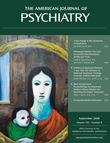In This Issue
Psychopathology in Children of Depressed Parents
Three new studies focus on mechanisms and treatment of childhood psychiatric disorders linked to parental depression. The importance of environment was demonstrated by Tully et al. (CME, p. Original article: 1148 ) in a comparison of adopted and nonadopted adolescents. The risks of most psychiatric disorders did not differ significantly between the adopted and nonadopted adolescents and were increased by depression in the mother, but not the father. This environmental contribution suggests that maternal treatment could benefit offspring as well, and the other two studies support this hypothesis. Pilowsky et al. (p. Original article: 1136 ) report that improvement over 1 year among mothers in the Sequenced Treatment Alternatives to Relieve Depression (STAR*D) study was associated with decreases in psychiatric symptoms among their children . Children benefited most if the mother experienced remission in the first 3 months of treatment, but improvement also occurred in children of mothers with later remissions. Most STAR*D treatments were medications, but Swartz et al. (p. Original article: 1155 ) found positive outcomes from psychotherapy in depressed mothers of children in psychiatric treatment. Mothers who received nine sessions of interpersonal psychotherapy were more improved at both 3 and 9 months than mothers following standard procedures. Children of the mothers receiving psychotherapy had greater reductions in depression only at 9 months, suggesting that this decrease was mediated by the mothers’ improvement. Two editorials (p. Original article: 1083 and Original article: 1086 ) examine these relationships further.

Gene Variants Promote Nicotine Dependence
Two separate sites in a gene cluster affecting nicotinic neuroreceptors were associated with the risk of nicotine dependence in 2,284 people from 219 families. Bierut et al. (p. Original article: 1163 ) report that each site had one form that was more common in people who smoked at least one pack of cigarettes daily than in casual smokers. These variants are located in a cluster of genes on chromosome 15 that influence three subunits of the nicotinic acetylcholine receptor. Functional significance for one site was demonstrated with a nicotine-enhancing drug, which evoked a blunted response in cells with the high-risk variant. Dr. Wade Berrettini reviews genetic research on nicotine addiction in an editorial on p. Original article: 1089 .
Alcoholism Remission in American Indians
Abatement of alcohol dependence among American Indians from eight reservations was associated with female sex, older age, marriage, earlier onset of dependence, and self-reported depressive symptoms from drinking. Gilder et al. (p. Original article: 1172 ) also found that the percentage of Native American heritage, severity of dependence, and treatment were not related to remission. Of the 580 participants surveyed, 254 met the criteria for lifetime alcohol dependence. However, the 59% remission rate within this subgroup was comparable to rates in national samples. Dr. Joseph Westermeyer comments on this high-risk population in an editorial on p. Original article: 1093 .
Genetic Sites Related to Schizophrenia and Cognitive Trait
A genome screen identified one location associated with schizophrenia and another related to a cognitive characteristic common to patients and unaffected relatives. A region on chromosome 19 was linked to a diagnosis of schizophrenia among 676 people in 43 families with multiple members affected by schizophrenia; this appears to be a new finding. A site on chromosome 5 was linked to efficiency of abstraction and mental flexibility and has previously been associated with schizophrenia. Almasy et al. (p. Original article: 1185 ) point out that identifying genetic locations related to disease features, rather than diagnoses, makes detection easier and may provide information about the mechanisms by which DNA variation results in disease. More on these methods is provided by Drs. Brzustowicz and Bassett in an editorial on p. Original article: 1096 .



